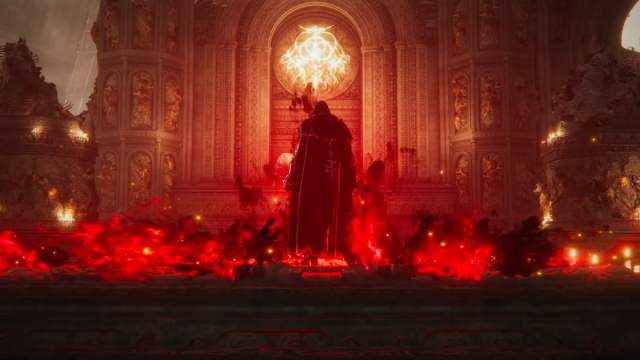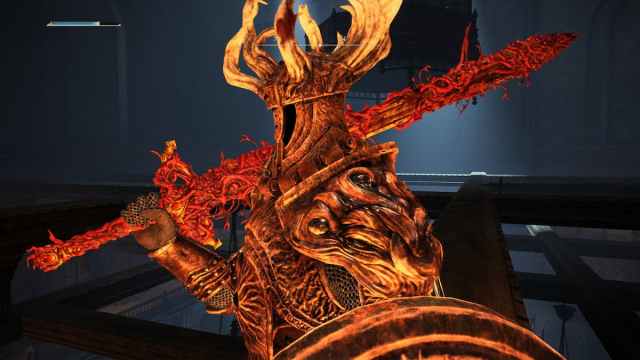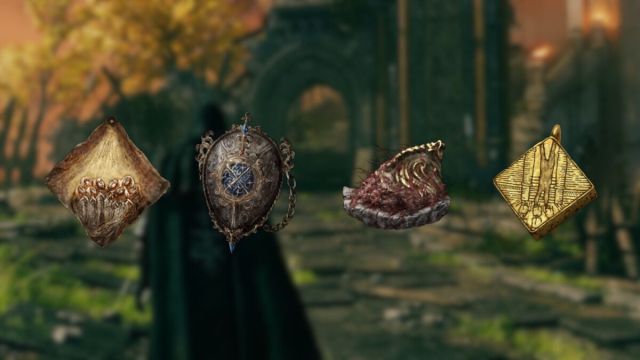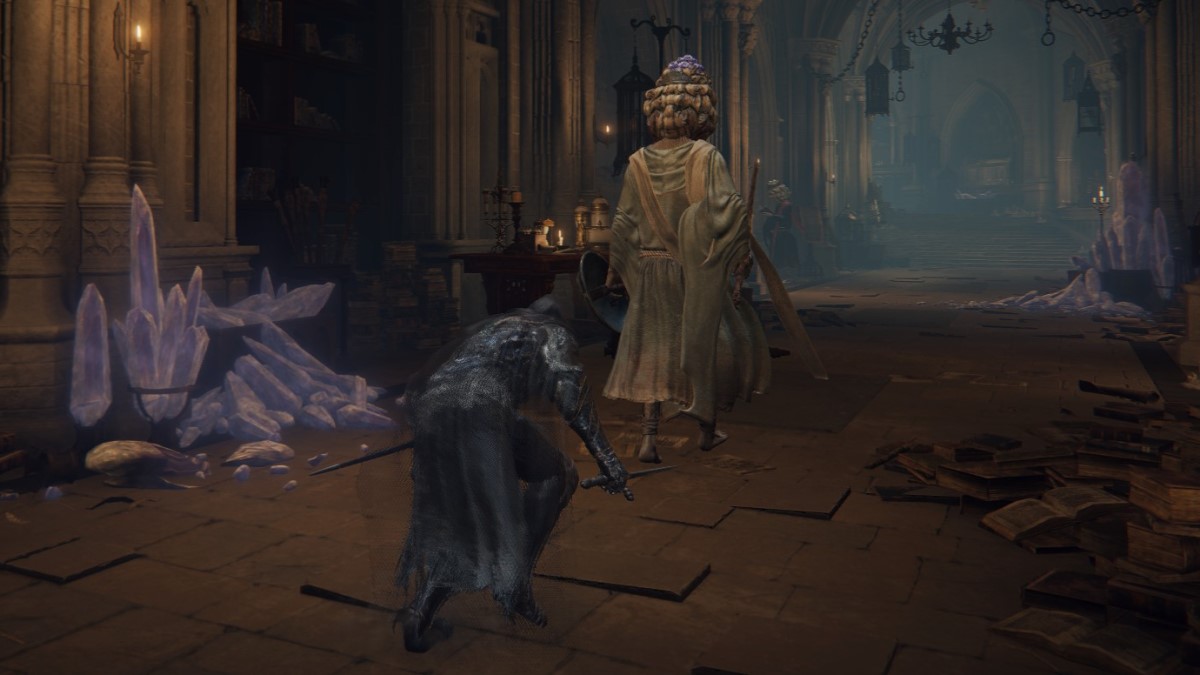The Confessor starter class gives you a jumpstart in roleplaying a hybrid melee caster character in Elden Ring. Its wide stat spread is its draw and weakness; it lets you build the character in many ways, but you won’t have optimal attribute distribution for lategame builds.
For our best Confessor build, we capitalized on thematic aspects of the class and focused on Faith and Strength to utilize powerful incantations and weapons. This build lets you vanquish the toughest enemies throughout your Elden Ring playthrough.
Best stats for Confessor build in Elden Ring

To utilize the melee caster playstyle, focus most of your attribute points on Faith and Strength. Vigor is an essential stat to consider for most builds. Since you’ll be in melee range during most of your encounters (barring some spellcasting from long range), you need to have enough HP not to get one shot. Mind and Endurance are stats for supporting your FP-hungry spells and melee playstyle, respectively.
You can leave Dexterity, Intelligence, and Arcane at starting levels unless you want to use equipment that necessitates further levels into those.
This is my recommended attribute distribution for a level 150 Confessor build:
- Vigor: 50
- Mind: 27
- Endurance: 23
- Strength: 40
- Dexterity: 16
- Intelligence: Nine
- Faith: 45
- Arcane: Nine
Starting out, I’d prioritize Vigor, Strength, and Faith—mostly in that order—to make progression easier. However, if you’re an Elden Ring veteran, you can focus on the latter two to become overpowered from the get-go.
Best weapons and seals for Confessor build in Elden Ring

As with any build in Elden Ring, you have an array of weapons to choose from. For the Confessor build, you’ll want weapons with Strength and Faith scaling primarily. While Strength boosts Physical damage, your high Faith amplifies Holy and Fire damage, all of which are your primary Confessor damage types.
For an ultimate lategame Confessor build, set your eyes on Miquellan Knight’s Sword, which you can get in the Miquella’s Haligtree dungeon. Alternatively, you can aim toward Blasphemous Blade (obtained by defeating Rykard in Mt. Gelmir), Zweihänder (purchased from the Isolated Merchant in Weeping Peninsula), Godslayer’s Greatsword (obtained by defeating Godskin Apostle in the Divine Tower of Caelid), or even beat the game with your starter weapon, the Broadsword. Given you are upgrading the weapon periodically and have the Sacred Blade Ash of War installed on it, your Broadsword is more than capable.
While weapons are the backbone of your melee caster playstyle, it’s the incantations that round off the kit. To bolster your incantations—both defensive and offensive—you’ll want to focus on acquiring Elden Ring’s best Sacred Seals. In that regard, Godslayer’s Seal and Clawmark Seal are your lategame options. Your starter Finger Seal isn’t too underpowered, either, but make sure you’re upgrading it regularly.
Best incantations for Confessor build in Elden Ring

While you can utilize utility spells to bolster your melee caster playstyle when building Confessor, you can also fall back on spells exclusively to deal damage and take a break from swinging your sword.
The best incantations for the Confessor build are:
- Flame, Grant me Strength: Raises your physical and fire-affinity attack power by 20 percent. Found at Fort Gael.
- Black Flame: Lets you throw a powerful projectile that deals good damage on impact and some useful damage over time. Found via Godskin Prayerbook.
- Lord’s Aid: Cures poison and reduces the buildup of poison, blood loss, and sleep. Found via Two Fingers’ Prayerbook.
- Lord’s Heal: Heals a massive chunk of HP. Found via Two Fingers’ Prayerbook.
- Pest Threads: Can make short work of bosses with large hitboxes. Obtained by progressing Millicent’s questline and handing her Valkyrie Prosthesis.
Best talismans for Confessor build in Elden Ring

For the four talisman slots, focus on the ones that bolster the strengths of your build and cover some of its weaknesses. A no-brainer is the Shard of Alexander. It raises the damage of all your skills by a significant 15 percent.
For the remaining slots, you can consider the following:
- Two Fingers Heirloom: Raises Faith by five. Found in the basement of Purified Ruins in Southeast Liurnia of the Lakes.
- Faithful’s Canvas Talisman: Increases the potency of Elden Ring incantations by four percent. Found on a corpse in Sellia Crystal Tunnel.
- Carian Filigreed Crest: Lowers the FP cost of skills by 25 percent. Purchased from War Counselor Iji as part of Blaidd’s questline or from Twin Maiden Husks at the Roundtable Hold after offering Iji’s Bell Bearing.
- Radagon Icon: Reduces cast time of spells. Found inside a treasure chest near the Debate Parlor site of grace in Raya Lucaria Academy.
You can also experiment with damage-boosting talismans like the Fire Scorpion Charm or the Sacred Scorpion Charm to boost your Fire and Holy damage respectively. They come with the caveat of lowering your damage negation, which shouldn’t be the biggest big of an issue considering the powerful healing at your disposal.
Best armor for Confessor build in Elden Ring

Armor for your Confessor build will mostly boil down to your fashion preferences. Just make sure you have enough Endurance to ensure a medium roll. While the starter Confessor armor is viable enough for even the whole playthrough, you can try other Paladin-looking armor sets to fully roleplay your Elden Ring Confessor.
I’d suggest taking a look at the following sets and pick up one that suits your fancy:
- Haligtree Knight Set
- Briar Set
- Mausoleum Knight Set
For the helmet slot, though, use the Ruler’s Mask, which raises your Faith by one. You can find this on a corpse near the Abandoned Coffin site of grace in West Altus Plateau.
This build guide was prepared on Elden Ring Patch 1.10.
Others Asked
What are the recommended stats for a level 120 Prisoner build in Elden Ring?
For a level 120 Prisoner build in Elden Ring, it is recommended to have 40 Vigor, 27 Mind, 11 Endurance, 24 Strength, 30 Dexterity, 52 Intelligence, 6 Faith, and 9 Arcane.
What are the recommended stats for an Assassin build in Elden Ring at level 150?
The recommended stats for an Assassin build at level 150 are Vigor: 60, Mind: 30, Endurance: 11, Strength: 10, Dexterity: 60, Intelligence: 20, Faith: Eight, Arcane: 30.
Which stats should you focus on leveling up for the Sword of Darkness build in Elden Ring?
You should level up Vigor to 40, Endurance to 35, Strength to 40, Dexterity to 25-35, and Faith to 35, while keeping Intelligence and Arcane at their base levels.












Published: May 22, 2024 09:22 pm